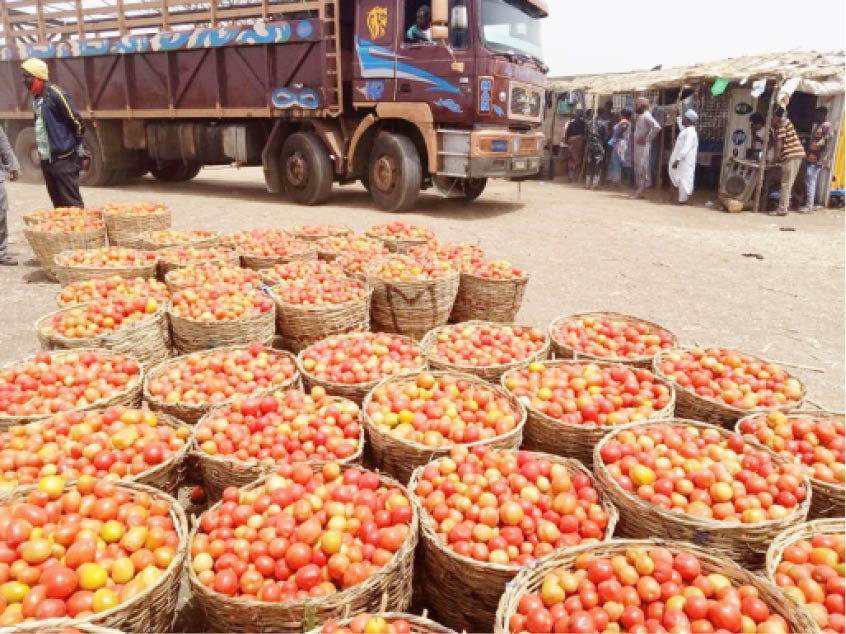Tomato farmers in Gombe State have expressed worries over post-harvest losses which, they said pose a significant threat to tomato production for both rainy and dry season farming in the state.
Our correspondent reports that Kwadon, Dadin-Kowa and Kumo towns are major areas where tomato is produced in Gombe State, but the farmers usually sell to consumers at giveaway prices due to lack of proper storage facilities.
Some farmers who spoke with Daily Trust on Sunday said tomato is a highly perishable fruit and prone to post-harvest spoilage and decay, if proper handling and storage practices are not followed.
A tomato farmer in Kwadon town of Yamaltu/Deba Local Government Area of Gombe State, Muhammad Abdullahi, said the lack of proper storage facilities usually lead to significant losses at the end of every harvest.
- Shettima to launch initiative to create 2,000 jobs in Gombe
- Gombe wheat farmers decry high cost of inputs
“Tomatoes are highly perishable and require specific storage conditions to remain fresh for an extended period. Without adequate storage facilities such as refrigeration or appropriate packaging, tomatoes are at risk of spoiling quickly, leading to significant losses,” he said.
Abdullahi added that with insufficient storage capacity, farmers may not be able to store their harvested tomatoes effectively, leading to wastage. “This not only results in financial losses for the farmers but also contributes to food waste and inefficiencies in the supply chain.”
According to him, due to the lack of storage facilities and companies that will buy the tomato in large quantities and process it, farmers are vulnerable to fluctuations in tomato prices.
“Without the ability to store surplus produce during times of oversupply, usually during harvest season, and release it gradually when demand is high, farmers may face price crashes, impacting their income and sustainability.
“As such, the lack of proper storage always limits our access to distant markets with higher demand and better prices for the tomatoes. Without adequate preservation options, farmers may be restricted to selling their produce locally, missing out on potential profitable opportunities elsewhere,” Abdullahi lamented.
He stated that the availability of reliable storage solutions is crucial for ensuring the success and sustainability of tomato farming by reducing post-harvest losses and enhancing market access for farmers.
Malam Abdullahi, who has spent over 40 years in the tomato business, said they were lucky this year because there were no recorded cases of tuta absoluta in tomato farms, a disease that ravaged their farms last year and made them incur losses.
But he lamented that because of the high cost of fuel, farmers are finding it difficult this year to transport the tomatoes to the southern part of the country, where the produce is purchased at a good price.
He, therefore, appealed to both federal and state governments to give agriculture a priority and fund the sector, by providing fertiliser, farm inputs and modern storage facilities for the farmers, which he said will improve farming and make people’s lives better.
“If a farmer can be supported, the country will prosper, feed itself and improve the economy.”
Commenting on the lack of market and storage facilities for tomato farmers, the National Publicity Secretary of the All-Farmers’ Association of Nigeria (AFAN), Muhammad Magaji Gettado, said the dormant Manto Processing Company in Kumo, Akko LGA of the state, was sold to an investor and it is expected to start production soonest.
He said when the company commences production fully, over 100 trucks of tomatoes are expected to be processed to produce tomato paste.
Gettado added that apart from reviving the tomato processing company, the Federal Ministry of Agriculture is introducing a modern preservation method where tomatoes can be kept for a longer time without spoiling.
“We are expecting that these interventions will help our farmers and make tomato farming profitable, to avoid a situation where the product is sold at a giveaway price, with a whole basket sold for N500 or less,” he said.

 Join Daily Trust WhatsApp Community For Quick Access To News and Happenings Around You.
Join Daily Trust WhatsApp Community For Quick Access To News and Happenings Around You.

